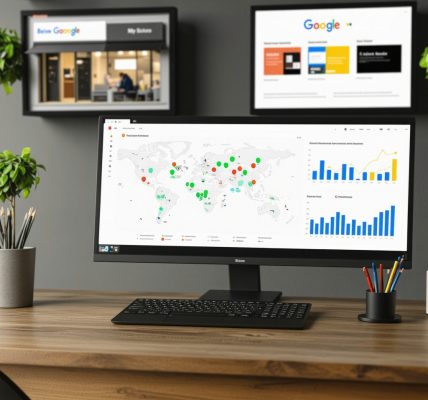Why I Started Caring About GMB Citation Management
When I first dipped my toes into local SEO, I underestimated how crucial Google My Business (GMB) citations were. I remember trying to boost a small local client’s visibility without properly managing their citations. The results? Frustratingly slow progress and inconsistent rankings. It was a wake-up call. From that moment, I became obsessed with mastering GMB citation management to build local SEO authority effectively.
The Little-Known Power of Consistent Citations
One key insight I learned is that consistency across all business listings is everything. I found that even minor discrepancies—like a missing comma or an inconsistent phone number—could confuse Google’s algorithms and hurt rankings. Regularly auditing and updating citations across directories, social platforms, and review sites has become my secret weapon.
Managing these citations carefully not only builds trust with Google but also signals to potential customers that the business is legitimate and active. It’s like leaving a trail of breadcrumbs that leads straight to your storefront.
How Do I Keep Track of All My GMB Citations Without Losing My Mind?
This was a question I kept asking myself when juggling multiple clients. My breakthrough came when I discovered specialized tools and services that streamline citation management. Platforms like BrightLocal (which I often reference for its thorough citation tracking and analysis) made it easier to identify inconsistent or duplicate citations quickly. You can learn more about tracking your GMB performance here.
The Role of Authoritative Citations in Building Local SEO Authority
From personal experience, not all citations are created equal. Linking your business to authoritative and relevant local directories can drastically improve your GMB rankings. I always prioritize building citations on trusted sites related to my clients’ industries and local communities. This approach aligns with Google’s emphasis on trustworthiness and relevance, which is well documented by SEO experts like Moz and Search Engine Journal.
What I Wish I Knew Earlier About Citation Management
One mistake I made early on was treating citation management as a one-time task. In reality, it’s an ongoing process. Local SEO and Google’s algorithms evolve constantly, so keeping citations fresh and accurate is essential. I now schedule regular citation audits and updates as part of my local SEO strategy, which has paid off handsomely in improved rankings and customer engagement.
If you want a step-by-step approach, I highly recommend checking out this guide on GMB citation management that helped me refine my process.
Want to Take Your Local SEO Authority to the Next Level?
Feel free to share your experiences or questions about managing GMB citations in the comments below. Whether you’re just starting or trying to optimize an existing profile, exchanging tips can spark new ideas. And if you’re looking for proven strategies, exploring expert GMB citation services might be a game changer for your local SEO growth.
One thing I’ve come to trust in this journey is that local SEO success is a blend of persistence, attention to detail, and leveraging the right resources. Managing your GMB citations effectively is a powerful step toward becoming a local authority in your niche.
Leveraging Niche-Specific Citations for Targeted Local Authority
Beyond general directories, niche-specific citations provide a significant advantage in local SEO authority. For example, a dental clinic benefits from citations on healthcare-related platforms, while a restaurant thrives on food and travel directories. These targeted citations not only enhance relevance but also boost trust signals to Google’s algorithms, aligning with the business’s core audience.
In my practice, identifying and securing citations on these specialized platforms has yielded higher-quality leads and improved local rankings. It’s a strategy that requires research and persistence but pays dividends in establishing your business as a local expert.
How Can Integrating GMB Citation Management with Customer Reviews Amplify Local Rankings?
Customer reviews and citations are two pillars that reinforce each other in local SEO. While citations validate your business details across platforms, authentic and frequent reviews improve your reputation and engagement metrics. Google’s local ranking factors emphasize the synergy between these elements, rewarding businesses that maintain consistent NAP (Name, Address, Phone) data and actively manage their reputation.
Proactively responding to reviews and encouraging satisfied customers to mention specific services can enrich your citation profiles with relevant keywords. This organic approach strengthens your GMB listing’s authority and relevance, driving not just visibility but also conversions.
Advanced Tools and Automation for Scalable Citation Management
Handling citation management manually quickly becomes impractical as your client base or business listings grow. Advanced tools like BrightLocal, Whitespark, and Moz Local offer automation features that streamline citation monitoring, correction, and reporting. These platforms provide actionable insights to identify citation gaps and track improvements over time.
Such tools also help detect duplicate or incorrect listings that can dilute your local SEO efforts. Integrating these solutions into your workflow enables a scalable approach that maintains citation integrity without becoming a time sink.
Understanding the Impact of Citation Velocity on Local SEO Growth
Citation velocity—the rate at which new citations are built—can influence local SEO performance. Gradually building citations over time is often more natural and sustainable than rapid, bulk submissions, which may appear spammy to search engines.
Balancing citation acquisition pace with quality ensures a steady increase in local authority, aligning with Google’s emphasis on organic growth signals. Monitoring citation velocity through tools and analytics allows you to fine-tune your strategy for optimum results.
How to Navigate Citation Challenges in Competitive Local Markets?
In highly competitive local markets, citation management requires extra finesse. Businesses face challenges like overlapping service areas, frequent data changes, and aggressive competitor tactics. To stand out, focusing on exclusive, verified citations on hyperlocal and industry-specific directories is crucial.
Additionally, combining citation management with other local SEO tactics such as GMB optimization, backlink building, and localized content marketing creates a comprehensive approach that outperforms isolated efforts.
For expert insights on comprehensive local SEO techniques, explore this guide which complements citation work by expanding your local digital footprint.
What Are the Emerging Trends in GMB Citation Management for 2025 and Beyond?
As local SEO evolves, new trends in GMB citation management are emerging. One key development is the increasing integration of AI-powered tools that predict citation opportunities and automate corrections with unprecedented accuracy. Additionally, voice search optimization is pushing businesses to ensure citations are optimized for natural language queries.
Another trend is the growing importance of citation data consistency across emerging platforms such as social media marketplaces and local community apps. Staying ahead requires continuous learning and adapting your citation strategies accordingly.
For a data-backed perspective on these trends, Moz’s recent Local SEO Ranking Factors Report 2024 offers authoritative insights that can inform your citation management roadmap.
Engage with this post by sharing your own experiences or challenges managing GMB citations. Your insights might help fellow local SEO professionals refine their strategies. And if you found this deep dive valuable, consider sharing it to spread expert knowledge in our community.
Why Citation Quality Sometimes Trumps Quantity: My Evolving Perspective
In the early days of managing GMB citations, I was laser-focused on building as many citations as possible, believing it was a numbers game. But over time, I’ve realized that quality truly outweighs quantity. A handful of authoritative, niche-relevant citations can drive more local SEO authority than dozens of generic or low-quality listings. This shift in mindset came after observing a client whose rankings stagnated despite aggressive citation building—until we refined our focus on credible local directories and industry-specific platforms.
This experience aligns with expert insights from Moz’s Local SEO Ranking Factors Report 2024, which emphasizes trustworthiness and relevance as pivotal citation qualities. It’s a reminder that citation strategies must be thoughtfully tailored, combining diligent research with an understanding of your business’s unique local ecosystem.
Balancing Automation and Personal Touch in Citation Management
Automation tools like BrightLocal and Whitespark have been game changers, especially when scaling citation management. However, I’ve learned that relying solely on automation can miss the nuance of local context. There’s a subtle art to crafting citation entries that resonate with local audiences and reflect brand personality—something no tool can fully replicate.
For this reason, I always combine automated citation audits with manual reviews, ensuring that every listing feels authentic and consistent. This hybrid approach also helps catch errors that automated systems might overlook, such as outdated service descriptions or new local partnerships that deserve mention.
How Do You Maintain Citation Consistency Amid Frequent Business Changes?
One of the trickiest challenges I face is keeping citations consistent when a business undergoes changes—whether it’s relocating, updating phone numbers, or rebranding. The key, in my experience, is establishing a centralized data management system for all business information and integrating it with citation efforts.
I use tools that synchronize updates across major citation platforms and supplement this with periodic manual checks to catch discrepancies on niche sites. This proactive stance prevents the confusion and ranking drops that inconsistent NAP data can cause.
Readers interested in a systematic approach might find the step-by-step guide on managing GMB citations particularly useful.
Personal Reflections on the Intersection of Citations and Reputation Management
Over time, I’ve come to see citation management as inseparable from reputation management. Citations don’t exist in a vacuum; they interact dynamically with customer reviews, local content, and social engagement. For instance, a well-cited business with active review responses signals to Google not just accuracy, but also vitality and trustworthiness.
This holistic perspective has influenced how I advise clients: managing citations is just one part of a broader local SEO ecosystem that includes strategic review generation and ongoing profile optimization. It’s a journey, not a checkbox.
Looking Ahead: What Emerging Citation Trends Should We Be Ready For?
As I dive deeper into local SEO for 2025 and beyond, I’m particularly intrigued by the rise of AI-powered citation monitoring and correction. These technologies promise to reduce manual workload and improve accuracy by anticipating issues before they impact rankings.
Another emerging trend is the significance of citations on unconventional platforms—think local community apps and social marketplaces—that are gaining traction as consumers seek hyperlocal experiences. Staying adaptive and open to experimenting with these channels is becoming part of my forward-thinking strategy.
For those eager to keep pace, exploring comprehensive local SEO optimization techniques can provide a strong foundation to integrate these new citation opportunities seamlessly. You might want to check out this guide on comprehensive local SEO that complements citation efforts beautifully.
Invitation to Share and Grow Together
I’d love to hear from you—whether you’ve encountered unique challenges in citation management or discovered innovative tactics that worked wonders for your local SEO. Sharing these experiences enriches our community and pushes us all toward smarter strategies.
Feel free to leave your thoughts or questions below. And if you’re looking for expert support to elevate your local SEO authority, exploring professional citation services might be the catalyst you need. Remember, growing local SEO success is a marathon with evolving checkpoints, and managing GMB citations thoughtfully is one of the most rewarding miles.
Harnessing the Synergy Between GMB Citations and Local Content Marketing
In my journey beyond basic citation management, I’ve discovered that embedding citations within a broader local content marketing framework profoundly amplifies local SEO authority. Instead of viewing citations as isolated data points, I treat them as integral components that interact dynamically with localized blog posts, community news, and event pages. This holistic approach creates a web of signals that Google interprets as a sign of authentic local relevance and engagement.
For example, when a local landscaping business not only secures authoritative citations but also publishes seasonal gardening tips tailored to the neighborhood, the combined effect reinforces their niche expertise and geographic focus. This strategy often complements the work outlined in guides like comprehensive local SEO optimization techniques, which emphasize multi-channel signals in ranking algorithms.
Deep Dive Into Citation Audit Nuances: Beyond NAP Consistency
While most practitioners focus on NAP (Name, Address, Phone) accuracy, I’ve learned that citation audits must extend to scrutinize supplementary data fields such as business hours, service descriptions, and even image metadata. Inconsistent or outdated ancillary information can subtly undermine a business’s trustworthiness in Google’s eyes, especially when competing in saturated local markets.
My audits now incorporate these nuanced checks, leveraging advanced tools and manual verification to ensure every data facet aligns perfectly. This meticulousness often uncovers overlooked discrepancies that, once corrected, yield tangible ranking improvements. If you’re curious about scaling citation management with precision, exploring advanced GMB citation management can offer valuable insights.
How Do I Integrate AI and Predictive Analytics Into Citation Management?
Integrating AI-powered tools has been a game changer in managing complex citation portfolios. These technologies analyze vast datasets to predict citation opportunities, flag inconsistencies before they harm rankings, and even recommend niche-specific directories tailored to a business’s unique profile. My approach combines these AI insights with hands-on expertise to maintain a balance between automation efficiency and the personalized touch that local SEO demands.
For instance, using predictive analytics allows me to preemptively build citations in emerging platforms, thus gaining an early mover advantage. This strategy aligns with findings from Search Engine Land’s 2024 analysis on AI in local SEO, which highlights increased accuracy and strategic foresight as key benefits (Search Engine Land, 2024). Embracing these tools helps maintain citation velocity with quality and relevance intact.
Elevate Your Strategy: Sharing Experiences and Exploring Collaborative Growth
Local SEO is an ever-evolving landscape where collective knowledge propels innovation. I invite you to share your nuanced challenges or success stories managing GMB citations and integrating emerging technologies. These exchanges often spark fresh perspectives that refine our strategies and foster community growth.
If you’re eager to deepen your expertise or need tailored guidance, don’t hesitate to explore expert GMB citation services that encapsulate advanced tactics proven to elevate local SEO authority. Remember, mastering citation management is a continuous journey of adaptation, and engaging in dialogue enriches that path.
Things I Wish I Knew Earlier (or You Might Find Surprising)
Small Details Make Big Differences
Early on, I overlooked how tiny inconsistencies—like a different phone format or a missing suite number—could stall local SEO progress. It wasn’t until I painstakingly audited every citation that I saw how these small details impact Google’s trust. Precision isn’t just nice to have—it’s essential.
One-Time Setup Isn’t Enough
I used to think citation management was a “set it and forget it” task. Reality check: businesses evolve, directories update, and new platforms emerge constantly. Regularly revisiting and refreshing citations has become a key habit that keeps local SEO authority strong over time.
Quality Beats Quantity Every Time
I chased volume early, building many citations without vetting their quality. But what truly moved the needle were authoritative, niche-relevant listings. It’s better to be featured on a handful of trusted, industry-specific directories than scattered everywhere with little impact.
Automation Helps, But The Human Touch Matters
Tools like BrightLocal are lifesavers for scale and consistency, but I’ve learned that manual reviews are crucial for capturing local nuances and brand personality. Automated audits don’t catch everything, especially when it comes to updating new services or community involvement.
Citations and Reviews Are Two Sides of the Same Coin
Managing citations without actively engaging with customer reviews felt incomplete. Reviews enrich your business profile and boost trust signals alongside consistent citations. Together, they create a robust local SEO foundation that attracts and converts customers.
Emerging Platforms Are Worth Watching
Beyond the usual directories, local community apps and social marketplaces are gaining traction. Keeping an eye on these spaces and adapting citation strategies accordingly can provide an unexpected edge in competitive markets.
Resources I’ve Come to Trust Over Time
Moz’s Local SEO Ranking Factors Report: Moz offers data-driven insights that helped me understand which citation qualities truly matter. Their 2024 report is a must-read for anyone serious about local SEO.
BrightLocal: This tool’s citation tracking and audit features have been invaluable for managing multiple clients’ listings efficiently without losing accuracy.
Search Engine Journal & Search Engine Land: These sites provide up-to-date articles and expert analysis—especially on trends like AI integration in local SEO—which helped me stay ahead of the curve.
RankingSEO GMB Guides: The practical, step-by-step guides at RankingSEO (like this one) have refined my approach and saved me hours in trial and error.
Parting Thoughts from My Perspective
Managing Google My Business citations effectively is more than just a technical checklist—it’s a careful blend of persistence, attention to detail, and strategic thinking. From my experience, investing time in quality citations and integrating them with local content and reviews creates a powerful local SEO authority that stands the test of evolving algorithms.
If you’re exploring ways to boost your local presence, don’t underestimate the value of consistent, authoritative citations paired with ongoing engagement. And if you’re curious about how to get started or optimize your existing efforts, diving into comprehensive resources or expert services can be a real game changer.
If this resonated with you, I’d love to hear your thoughts or experiences managing GMB citations. Share your story or questions below, and let’s learn and grow together in this local SEO journey.




